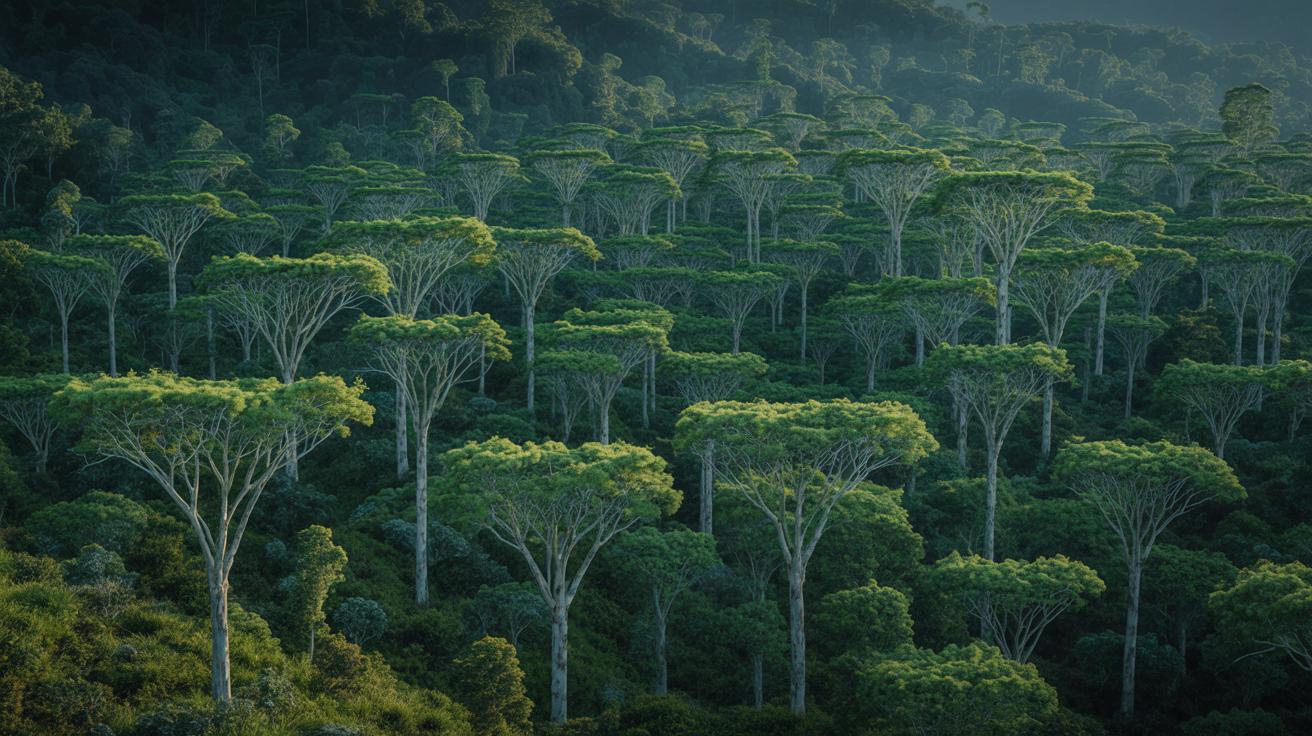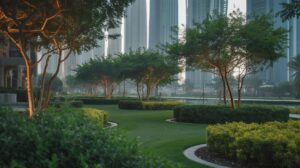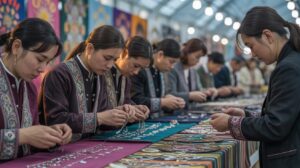What You Need to Know
- 🌱 Innovative Technology: Sarawak is utilizing advanced plant tissue culture techniques to enhance the growth and productivity of its forest plantations.
- 🚀 Productivity Boost: Eucalyptus hybrids propagated through tissue culture have shown over 50% higher Mean Annual Increment compared to traditional methods.
- 🤝 Collaborative Efforts: The partnership between the Forest Department Sarawak and Samling Group demonstrates the power of public-private collaboration in advancing sustainable forestry.
- 🌍 Sustainable Practices: By increasing plantation yields, Sarawak aims to reduce its dependence on natural forests, contributing to environmental conservation and biodiversity protection.
- 📈 Economic Impact: The increased timber productivity strengthens Sarawak’s position in the global market, offering significant economic benefits to the local economy.
In the lush landscapes of Sarawak, Malaysia, a technological revolution in forestry is quietly taking place. The application of plant tissue culture technology is poised to significantly enhance the productivity of forest plantations in the region. Recent developments have shown promising results, suggesting that this advanced biotechnology could be a game-changer for the timber industry. As the world grapples with the challenge of sustainable resource management, the innovations in Sarawak offer a beacon of hope and a model worth emulating. Let’s delve into the details of this transformative approach and explore what it means for the future of forest management.
The Role of Plant Tissue Culture in Forestry
The Forest Department Sarawak (FDS) is at the forefront of integrating plant tissue culture techniques into forestry practices. This method involves the cultivation of plant cells in a controlled environment, allowing for the mass propagation of specific plant species. The benefits are manifold: it leads to the production of uniform and high-quality planting materials, which are crucial for large-scale plantation projects.
In Sarawak, the focus has been on Eucalyptus hybrids, plants known for their rapid growth and adaptability. By utilizing tissue culture-derived clones, the region has reported a remarkable increase in the Mean Annual Increment (MAI)—over 50% higher than conventional seed-derived plantations. This leap in productivity is not just a boost for the industry but also a step towards more sustainable forestry practices, reducing the pressure on natural forests.
Samling Group’s Innovative Approach
The Samling Group, a key player in Sarawak’s timber industry, has been instrumental in advancing tissue culture technology. Their facilities in Bintulu showcase the latest in biotechnological applications, demonstrating a commitment to innovation. During a recent visit by FDS director Datuk Hamden Mohammad, alongside a team of researchers, the group presented their cutting-edge techniques and impressive results.
Samling’s approach involves the careful propagation of Eucalyptus clones under sterile conditions, ensuring high survival rates and optimal growth. The company aims to produce between 1.7 and 2.4 million plantlets by 2025, with plans to scale up to 25 million annually. Such ambitious targets underline the potential of tissue culture in meeting future wood demands while maintaining ecological balance. The collaboration between Samling and the Forest Department sets a precedent for public-private partnerships in advancing sustainable forestry.
Implications for Sarawak’s Timber Industry
The advancements in plant tissue culture have far-reaching implications for Sarawak’s timber industry. By enhancing plantation productivity, the region can strengthen its position in the global market. The increased yield from tissue culture-derived plantations translates into higher economic returns, providing a significant boost to the local economy. Moreover, the use of high-quality clones ensures a more consistent and reliable supply of timber products.
Environmental sustainability is another crucial aspect of this development. With the ability to produce more wood on less land, Sarawak can reduce its reliance on logging from natural forests, thus preserving biodiversity and protecting ecosystems. This approach aligns with global trends towards sustainable resource management and climate change mitigation. As consumer demand shifts towards ethically sourced products, Sarawak’s innovative practices could set a benchmark for others to follow.
Looking Ahead: Challenges and Opportunities
While the potential of plant tissue culture in forestry is immense, it is not without challenges. The initial costs of setting up and maintaining tissue culture laboratories can be high, requiring significant investment. Additionally, there is a need for trained personnel to manage and execute these sophisticated techniques. However, the long-term benefits, both economic and environmental, make it a worthwhile endeavor.
The success of Sarawak’s initiatives could inspire other regions to adopt similar practices. As the world faces increasing pressure to balance economic growth with environmental conservation, innovative solutions like tissue culture offer a path forward. The question remains: how can other regions replicate Sarawak’s success and what role will global collaboration play in spreading these innovations?
The journey of plant tissue culture in Sarawak is just beginning, and the possibilities are vast. As the region continues to explore and expand this technology, the world will be watching with keen interest. The advancements hold lessons for sustainable forestry globally, offering insights into how we can meet human needs without compromising the planet’s health. Could this be the key to a more sustainable future for forestry worldwide, and what steps are needed to ensure its widespread adoption?
Did you like it?4.4/5 (27)







7 comments
milo
What a fantastic breakthrough! Will this technology be shared internationally, or is it exclusive to Sarawak for now? 🤔
ayden
Great job, Sarawak! I hope other regions follow your lead in sustainable forestry practices. We need more initiatives like this.
Rose
I’m curious about the economic benefits. How much revenue can this potentially generate for the local community?
Emily
Is there any risk of these tissue culture techniques affecting the local biodiversity in Sarawak?
LincolnRaven
This sounds like science fiction! Eucalyptus hybrids taking over the world, one tree at a time. 😂
Emily
Thank you for sharing this innovative approach! It’s inspiring to see Sarawak leading the way in sustainable forestry. Keep up the great work!
hunterdreamweaver
Wow, over 50% boost in productivity? That’s incredible! How soon can we expect to see these changes in the timber market? 🌳